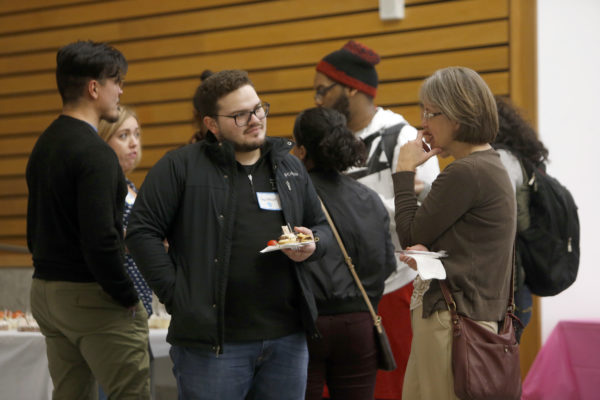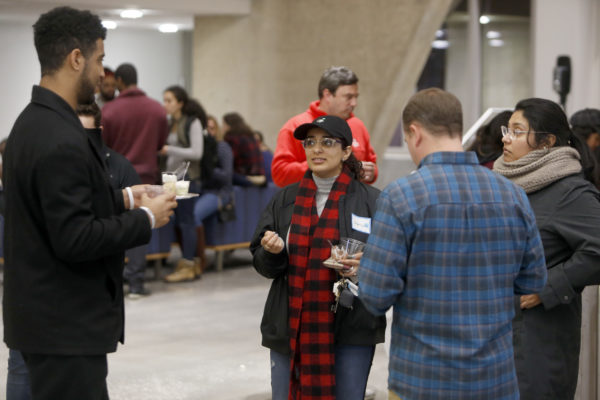
A lively group of students, faculty, staff and postdocs participating in the Fisk-Vanderbilt Master’s-to-Ph.D. Bridge Program recently gathered in the lobby of the Vanderbilt Engineering and Science Building for the program’s annual mentor mixer. The mixer connects students in the program to potential mentors and creates networking opportunities for all in attendance.
“Mentoring is important for everyone, but it can be especially challenging for scientists from underrepresented groups to find people to add to their support network. This mixer is meant to gather people who are interested in mentoring and being mentored by one another,” said Kelly Holley-Bockelmann, associate professor of physics and astronomy and co-director of the Fisk-Vanderbilt Bridge Program. “At the end, we hope that everyone will identify a personal ‘board of directors’ full of mentors who will help them grow as a person and thrive as a scientist. “
The Fisk-Vanderbilt Bridge Program is a nationally recognized leader in developing top talent among underrepresented groups in STEM. The program, which was founded more than 14 years ago, provides numerous support services and resources for students as they consider a career in academia or the workforce.
In the first two years of the program, students work toward a master’s degree at Fisk University, with access to instructional and research opportunities at both Fisk and Vanderbilt. In addition to receiving full funding to cover tuition and fees at Fisk, students receive a monthly stipend during their master’s program. A signature feature of the program is the opportunity for students to form meaningful mentoring relationships with one another and with faculty, staff and postdocs involved with the program as they build toward their goal of earning a Ph.D.
The program has produced several groundbreaking graduates, such as the first African American woman to receive a Ph.D. in astronomy at Yale University, the first Native Hawaiian to earn an NSF graduate research fellowship, and the first member of the Yankton Sioux nation to earn a degree in physics.

Fisk master’s student Stephanie Morris noted that the academic support offered by the program was helpful to her. “The bridge program provides assistance and support with coursework through the various tutoring opportunities they offer. They also have periodic check-ins to see how we are doing and to make sure we are on track in getting to the goals we have set for ourselves,” Morris said. “I would encourage anyone interested in graduate school in the STEM field to consider applying to this program.”
Mentors at the mixer also spoke highly of the program and the long-term impact it has on students. “This program is really geared toward preparing students to be successful not just in applying to a Ph.D. program, but in preparing students to be successful throughout graduate school and beyond,” said Christina Keeton, manager of the Vanderbilt Initiative for Maximizing Student Diversity, co-director of the Vanderbilt Summer Science Academy and mentor in the program.“I was a graduate student once and I understand the life and struggles students might face, so I hope that through being a mentor I can help students currently in graduate school get through this process.”
The recent mentor mixer is one of several opportunities the program provides to participants. Other services offered by the program include: supporting students in identifying internship opportunities at national labs; providing guidance on how to communicate their research and create effective presentations; helping students prepare for qualifying exams; thesis and defense preparation; and job talks and job placements.
Visit the Fisk-Vanderbilt Masters-to-Ph.D. Bridge Program website to learn more.